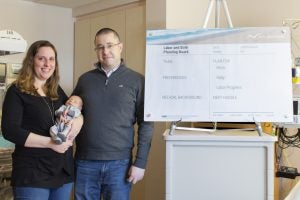Kelly and Michael Davoli delivered their son, Michael, at South Shore Hospital, one of four pilot sites testing tools, including the Labor and Birth Planning Board, created by Ariadne’s Team Birth Project. Team Birth’s tactics have gotten widespread media attention.
A string of articles and news stories citing Ariadne Labs and its partners is adding to the growing awareness of the need to improve the well-being of American mothers and that something can – and is – being done about it.
The stories range from large features in major newspapers to shorter stories on local news sites. All cite the work being done by Ariadne’s Delivery Decisions Initiative, which aims to improve both safety and dignity for people who are trying to start or grow their families. Many stories cite a crucial observation by Dr. Neel Shah, director of the Delivery Decisions Initiative: “An American mom today is 50 percent more likely to die in childbirth than her own mother was …. and the risk is consistently three to four times higher for black women than white women, irrespective of income or education.”
At the heart of the Delivery Decisions Initiative is the Team Birth Project, which has generated its own media coverage around issues of maternal health, improving birth experiences, and overtreatment – such as potentially unnecessary C-sections. For instance, an opinion piece published in The New York Times examined efforts to reduce C-sections through teamwork, support, and communication. “Women have goals in labor other than coming out unscathed. Survival, and not being cut open, should be the floor,” Shah told the writer.
Coverage of the Team Birth Project also included a gripping story about the high-risk delivery of twin boys at South Shore Hospital in Weymouth, Mass. (The hospital is one of four pilot sites testing Team Birth tools, training, and implementation strategies.) WBUR reporter Martha Bebinger recounted in dramatic detail how the mother worked with the hospital’s obstetrics team to give birth to the second of her twins without a C-section.
Boston Fox 25 also covered the Team Birth Project at South Shore Hospital, and emphasized how open communication might impact the number of elective C-sections. “We do know when we need to do a C-section, and we really know when it is not appropriate. Everyone agrees there. But to hone in on this middle section, where it is gray and fuzzy, is where we forced our attention to be,” Dr. Amber Weiseth, associate director of the Delivery Decisions Initiative, said during the broadcast.
A story in HealthLeaders explains Team Birth’s general approach, from creating a labor storyboard using whiteboards to holding team “huddles” in which all parties confer. The team also records the mother’s preference and care plan during labor and birth.
Other Team Birth pilot sites have made the news. Overlake Medical Center and EvergreenHealth Hospital in Washington, for instance, have been covered by the 425 Magazine and KIRO 7 News. Presence Magazine published a feature on the project launch at St. Francis Hospital in Tulsa, Oklahoma, and the local Fox affiliate produced a video.
An article in Vox detailed varying C-section rates at hospitals, while the Harvard Business Review underscored how the architecture of hospitals affects health outcomes. “The biggest risk factor [for a C-section] is not a woman’s personal risks — it’s what (hospital) door you walk through,” Shah told Vox. His team collaborated with the MASS Design Group to research how childbirth facility design impacts care. “There’s no health care service in the U.S. that varies as much as this one; cesarean rates by hospital go from seven percent to 70 percent.”
ABC News highlighted tragic cases of mothers who died during childbirth and from postpartum depression, deaths that might have been preventable. The report features an interview with Shah in which he examines the risk differentials between black and white expectant mothers.
“It’s not just about patient safety and clinical liability,” Overlake Medical Center president and CEO Mike Marsh told the Bellevue Reporter. “It’s also about the experience. The experience in today’s environment requires communicating [with] our patients and their families in the process. That’s what I see this wonderful opportunity with Ariadne will bring for us to elevate our game, in terms of how do we engage with our patients, their families, and their care.”
–Stephanie Schorow



